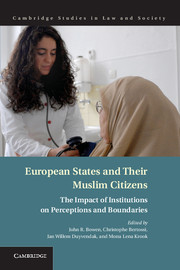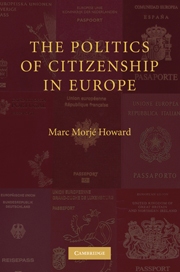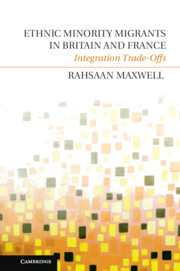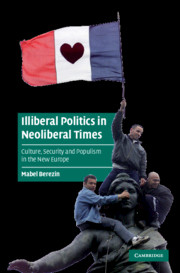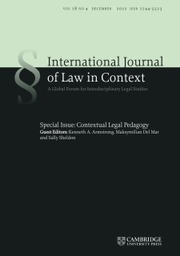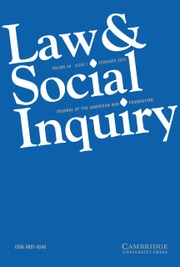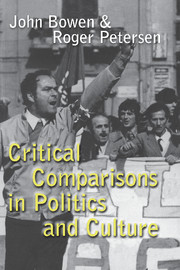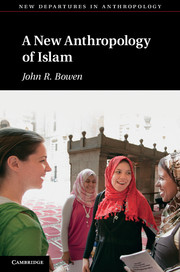European States and their Muslim Citizens
The Impact of Institutions on Perceptions and Boundaries
$41.99 ( ) USD
Part of Cambridge Studies in Law and Society
- Editors:
- John R. Bowen, Washington University, St Louis
- Christophe Bertossi, French Institute of International Relations, Center for Migration and Citizenship
- Jan Willem Duyvendak, Universiteit van Amsterdam
- Mona Lena Krook, Rutgers University, New Jersey
- Date Published: No date available
- availability: This ISBN is for an eBook version which is distributed on our behalf by a third party.
- format: Adobe eBook Reader
- isbn: 9781107496972
Find out more about Cambridge eBooks
$
41.99 USD
( )
Adobe eBook Reader
Other available formats:
Paperback, Hardback
Looking for an examination copy?
This title is not currently available for examination. However, if you are interested in the title for your course we can consider offering an examination copy. To register your interest please contact [email protected] providing details of the course you are teaching.
-
This book responds to the often loud debates about the place of Muslims in Western Europe by proposing an analysis based in institutions, including schools, courts, hospitals, the military, electoral politics, the labor market, and civic education courses. The contributors consider the way people draw on practical schemas regarding others in their midst who are often categorized as Muslims. Chapters based on fieldwork and policy analysis across several countries examine how people interact in their everyday work lives, where they construct moral boundaries, and how they formulate policies concerning tolerable diversity, immigration, discrimination, and political representation. Rather than assuming that each country has its own national ideology that explains such interactions, contributors trace diverse pathways along which institutions complicate or disrupt allegedly consistent national ideologies. These studies shed light on how Muslims encounter particular faces and facets of the state as they go about their lives, seeking help and legitimacy as new citizens of a fast-changing Europe.
Read more- Considers the most important institutions in a number of countries: schools, hospitals, the army, courts related to their Muslim citizens
- Explains how policies about tolerable diversity, immigration, and discrimination are created and applied
- Combines contrasts across institutions with contrasts across major countries, including France, Germany, Britain, Sweden, Norway, and The Netherlands
Reviews & endorsements
'This strikingly original volume takes debates about Muslims in Europe into new and exciting territory. It replaces simplistic models of national integration with a more subtle analysis of the intersection between national ideologies and the practical schemas for dealing with Muslims in many different institutions. Each chapter is a model of ethnographic rigour, insight and irony. The result is an ambitious, sophisticated and exceptionally well-crafted volume that deserves to be taken seriously by all researchers and policy makers concerned with Europe's Muslims.' James A. Beckford, University of Warwick
See more reviews'Connecting practical schemas, institutions, and boundary work, the chapters assembled here represent a real advance in our understanding of Muslims in Europe. The authors convincingly show how civic education courses, the army, hospitals, labor markets, and the judicial sphere are contexts where moral boundaries articulated around sex, gender and religion emerge and where institutional logics clash. Thus the case studies go beyond national models to reveal competing logics across institutional and countries. Theoretically, this remarkable collective effort raises new and provocative questions for institutionalist and cultural analysts across the social sciences. Substantively, it contributes mightily to our understanding of the future of diversity and multiculturalism in Europe, a topic of ever-growing urgency.' Michèle Lamont, Robert I. Goldman Professor of European Studies and Professor of Sociology and African and African-American Studies, Harvard University
Customer reviews
Not yet reviewed
Be the first to review
Review was not posted due to profanity
×Product details
- format: Adobe eBook Reader
- isbn: 9781107496972
- availability: This ISBN is for an eBook version which is distributed on our behalf by a third party.
Table of Contents
1. An institutional approach to framing Muslims in Europe John R. Bowen, Christophe Bertossi, Jan Willem Duyvendak and Mona Lena Krook
Part I. Practical Schemas in Everyday Institutional Life:
2. Hospitals as sites of cultural confrontation and integration in France and Germany Carolyn Sargent and Susan L. Erikson
3. Schooling and new religious diversity across four European countries Thijl Sunier
4. French 'Muslim' soldiers? Social change and pragmatism in a military institution Christophe Bertossi
5. Practical schemas, conjunctures, and social locations: laïcité in French hospitals and schools Christophe Bertossi and John R. Bowen
Part II. Institutions and National Political Ideologies:
6. Juridical framings of Islam in France and Germany John R. Bowen and Mathias Rohe
7. Legitimizing host country institutions: a comparative analysis of civic education courses in France and Germany Ines Michalowski
8. Minorities in electoral politics: gender, race, and political inclusion in Sweden, France, and Britain Mona Lena Krook
9. How institutional context shapes headscarf debates across Scandinavia Birte Siim
10. Populism, sexual politics, and the exclusion of Muslims in the Netherlands Justus Uitermark, Paul Mepschen and Jan Willem Duyvendak
11. Conclusion John R. Bowen, Christophe Bertossi, Jan Willem Duyvendak and Mona Lena Krook.
Sorry, this resource is locked
Please register or sign in to request access. If you are having problems accessing these resources please email [email protected]
Register Sign in» Proceed
You are now leaving the Cambridge University Press website. Your eBook purchase and download will be completed by our partner www.ebooks.com. Please see the permission section of the www.ebooks.com catalogue page for details of the print & copy limits on our eBooks.
Continue ×Are you sure you want to delete your account?
This cannot be undone.
Thank you for your feedback which will help us improve our service.
If you requested a response, we will make sure to get back to you shortly.
×
